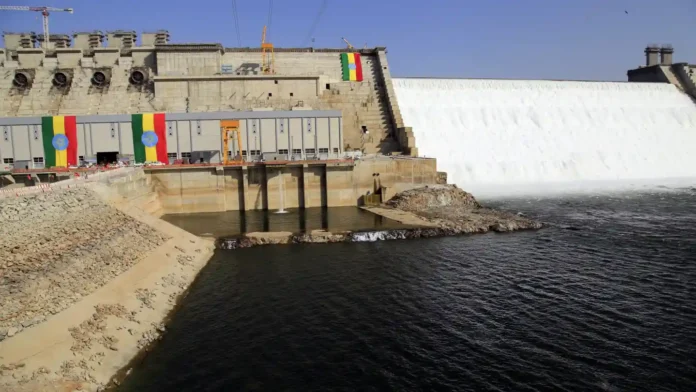Cairo, Egypt – Egypt is facing mounting anxiety as Ethiopia readies to complete the fifth and final filling of its Grand Ethiopian Renaissance Dam (GERD) by the end of July.
The multibillion-dollar infrastructure project, which is now over 94% complete, threatens to exacerbate Egypt’s longstanding water shortages, creating a tense diplomatic standoff between the two nations.
The GERD, set to add 23 billion cubic meters of water to its reservoir in this final phase, will bring the total storage capacity to 64 billion cubic meters, an area roughly 300 square kilometers larger than Greater London.
This massive expansion has raised alarm bells in Cairo, where officials fear a significant reduction in their share of the Nile River’s waters—a vital resource for the country’s 106 million residents.
Egyptian officials have long expressed concerns that the dam, located on the Blue Nile River, could critically impact their water supply. The Nile is crucial for Egypt’s agriculture, food security, and overall economic stability.
President Abdel Fattah el-Sisi has termed the GERD an “existential threat” to his country, reflecting the gravity of the situation. The Egyptian government’s apprehensions are compounded by worsening water shortages in urban areas, which could fuel political discontent.
Since abandoning diplomatic negotiations in December, Cairo has accused Ethiopia of stalling to complete the dam regardless of the potential consequences for downstream nations.
Egypt’s primary demand has been for a legally binding agreement on the dam’s operation to safeguard its water rights, an appeal Ethiopia has rebuffed, viewing it as an infringement on its sovereignty.
Ethiopia argues that the GERD is essential for its development, aiming to provide electricity to its population of over 123 million, nearly half of whom currently lack access to power.
The Ethiopian government views the dam as a transformative project that will boost its economic prospects, despite the growing concerns in Cairo about its potential negative impacts.
In response to the GERD’s latest filling, the Egyptian parliament has intensified its debates, with lawmakers urging the government to find solutions amid failed diplomatic efforts.
Ehab Ramzi, a member of the House of Deputies, has expressed widespread apprehension, emphasizing the need for urgent action to address the perceived threats posed by the dam.
The Egyptian Ministry of Irrigation and Water Resources has warned of severe consequences if the dam negatively affects the country’s water supply. Minister Hani Sweilam has hinted at possible repercussions for Ethiopia, though specific measures remain undisclosed.
Amid official silence on concrete actions, speculation has grown that Egypt’s security apparatus may be evaluating potential strategies to counter the impact of the GERD.
Some observers, including Diaeddine al-Qousi, a former advisor to the Egyptian minister of irrigation, suggest that Ethiopia’s dam might be intended not only for electricity generation but also as a leverage tool over Egypt’s water resources.
As Egypt navigates this high-stakes scenario, it faces a dual challenge: adapting to reduced Nile water inflows and addressing the broader threats of climate change, which endanger its coastal and agricultural regions.
The final outcome will hinge on how Ethiopia manages the dam’s operations post-completion and whether diplomatic or alternative solutions can mitigate the impact on Egypt’s vital water supply.
For now, the situation remains fraught with tension, as Egypt waits to see the full implications of Ethiopia’s latest move on the GERD.
This article was created using automation technology and was thoroughly edited and fact-checked by one of our editorial staff members

